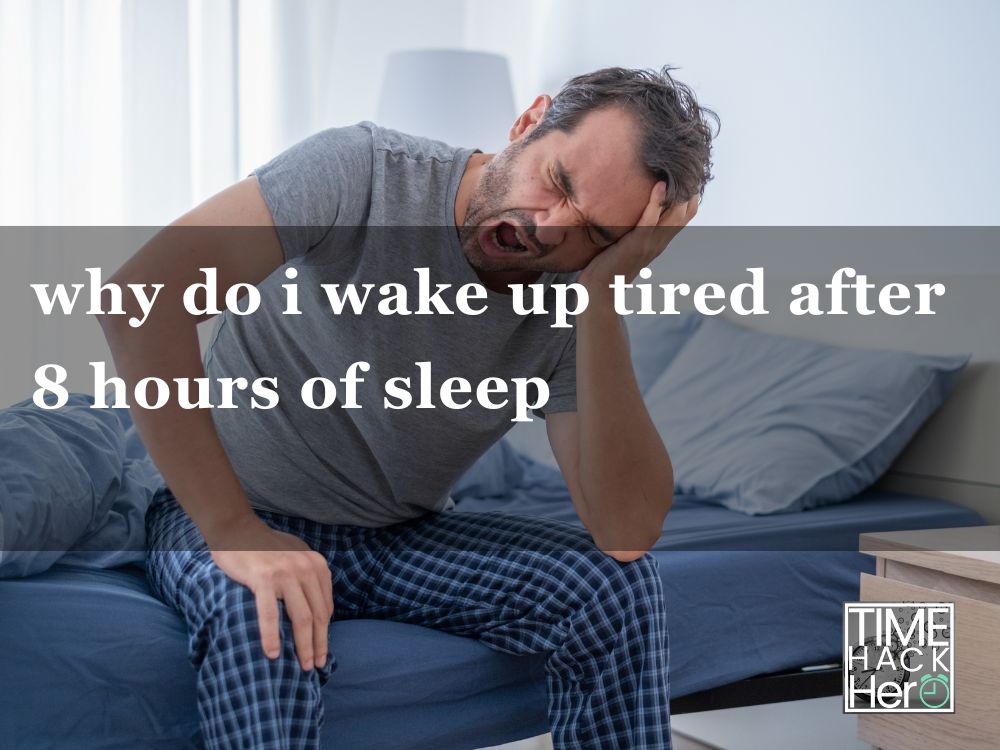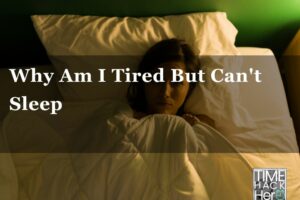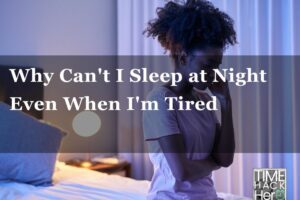Getting a full 8 hours of shuteye is recommended for adults to recharge. So why do many people still feel fatigued when the alarm goes off in the morning? While the exact amount of sleep needed varies per individual, regularly waking up tired after what’s considered an adequate night’s rest could signal an underlying issue.
Understanding the potential reasons you may feel unrested after 8 hours in bed can help you identify and address any problems. With some adjustments to sleep habits and lifestyle, you can start waking up feeling refreshed and energized.
Table of Contents
How Much Sleep Do Adults Need?
The National Sleep Foundation recommends 7-9 hours of sleep per night for adults ages 18-64. Newborns, children, teens, and older adults have different suggested sleep ranges [1].
However, sleep needs vary significantly by individual. Some function fine on just 6 hours, while others require 10 hours daily. The optimal amount depends on factors like genetics, health, and lifestyle.
If you consistently feel tired most mornings despite getting 7-9 hours of sleep, you may need to sleep longer to match your body’s requirements. Or, an underlying issue could be impacting your sleep quality.
Is This Normal?
It’s normal to feel a little groggy immediately upon waking up, even after a good night’s sleep. As you go about your morning routine, you should feel alertness set in within an hour or so. But if you still feel drained, yawn excessively, and struggle to get going after 8 hours in bed, this could be problematic.
Experts suggest that regularly waking up tired after 8 hours of sleep may be indicative of:
- An underlying health condition
- A primary sleep disorder
- Poor sleep hygiene habits
- High stress levels
- Disruption from environmental factors
Occasionally waking up fatigued after 8 hours isn’t concerning. But if it occurs frequently or daily, it likely signals an issue leading to inadequate sleep quality and quantity. Consulting a doctor is wise to identify and address any underlying causes.
9 Reasons You May Still Feel Tired After 8 Hours of Sleep
There are several possible explanations for waking up tired even after spending enough time in bed:
1. Sleep Disorders
Conditions like insomnia, sleep apnea, narcolepsy, restless leg syndrome, etc. lead to disrupted, fragmented sleep and impaired sleep quality. Even with enough time in bed, the poor rest makes you feel unrested.
2. Medication Side Effects
Certain prescription drugs, such as diuretics, beta blockers, antidepressants, and steroids, can interfere with sleep as a side effect.
3. Underlying Conditions
Health issues like hypothyroidism, asthma, diabetes, arthritis, depression, chronic pain, and gastroesophageal reflux disease (GERD) often impair sleep.
4. Poor Sleep Habits
Going to bed too late, irregular sleep schedules, using electronics before bed, uncomfortable sleep environment, and other bad sleep hygiene habits prevent deep, high-quality slumber.
5. Stress and Anxiety
High stress and anxiety often manifest as insomnia and restless thoughts at night, diminishing sleep quality. This prevents you from feeling refreshed in the morning.
6. Disruption During Sleep
Environmental disturbances from light, noise, pets, sleeping partners, and room temperature fluctuations during the night all reduce sleep quality.
7. Age
As we age, sleep tends to become lighter and more prone to disruption, so older adults may feel less rested.
8. Sleep Deficiency
If you accumulate a sleep debt from not getting enough hours over a period of days or weeks, just one night of 8 hours may not be sufficient to recover fully.
9. Timing Issues
Your circadian rhythm may be misaligned, so even if getting enough sleep, the body isn’t synced right to feel restored.
Effects of Waking Up Tired After 8 Hours of Sleep
Being fatigued first thing in the morning can impact you both mentally and physically:
- Difficulty focusing, reduced alertness, lack of motivation
- Increased irritability, mood swings, amplified stress
- Higher risk of headaches and migraines
- Weaker immunity, frequent colds and infections
- Reduced performance at work, school, or while exercising
- Greater injury risk if motor skills and coordination are impaired
- Increased errors, accidents, and safety issues
- Dangerous drowsy driving if operating motor vehicles
- Weight gain, poorer diet, and increased cravings
- Onset or worsening of anxiety and depression
If waking up tired persists long-term, it can increase obesity, heart disease, hypertension, stroke, and diabetes risks.
Ways to Fix Waking Up Tired After 8 Hours of Sleep
If you regularly feel unrested in the morning after 8 hours in bed, try these troubleshooting tips:
- Check for underlying health issues – Get screened for conditions like sleep apnea and thyroid disorders which can impair sleep.
- Talk to your doctor – Discuss if any medications you take could be disrupting sleep. Adjust timing or dosage or switch to alternatives.
- Exercise regularly – Daily physical activity helps regulate circadian rhythms and promotes higher sleep quality.
- Check bedroom environment – Ensure room is cool, comfortable, dark, and quiet during sleep. Limit light and noise.
- Establish a soothing pre-bed routine – Take a bath, read a book, meditate, or listen to calm music to wind down.
- Avoid electronics before bed – Power down TV, phones, and laptops an hour before bedtime. The blue light impairs melatonin release.
- Stop eating close to bedtime – Finish dinner and snacks at least 2-3 hours before lying down.
- Limit alcohol and caffeine – Avoid coffee, tea, soda, and alcohol in the evenings as these disrupt sleep cycles.
- Try sleep supplements – Talk to your doctor about supplements like melatonin, magnesium, glycine, valerian root, chamomile, etc. that may improve sleep.
- Use sleep aids judiciously – Prescription or over-the-counter sleep aids can help short-term but shouldn’t replace addressing root causes.
- Keep a sleep diary – Track sleep patterns and habits to understand cyclical issues and identify targets for change.
- Practice stress management – Try yoga, meditation, mindfulness, cognitive behavioral therapy (CBT) to lower stress and anxiety that impairs sleep.
Conclusion
It’s not uncommon to feel a bit groggy upon waking up. But regularly feeling unrested and fatigued even after devoting 8 hours to sleep warrants attention. Failure to address inadequate sleep can lead to impairments across both physical and mental health. Identifying any underlying health issues, sleep disorders, or poor sleep hygiene habits allowing disruption to sleep is key. Adjusting your daily schedule, wind-down routine, sleep environment, exercise, diet, and stress management strategies can help optimize sleep cycles so you arise each morning feeling refreshed and energized.
Frequently Asked Questions
Is it normal to be tired after 8 hours of sleep?
It is common to feel somewhat sleepy when you first wake up. But ongoing fatigue and lack of energy throughout the day after 8 hours of sleep is not normal and likely indicates disrupted sleep or an underlying health issue.
How many hours of sleep do you need to not feel tired?
The exact amount of sleep needed varies per individual, but most adults require 7-9 hours per night. Getting this amount of quality, uninterrupted sleep should prevent regular feelings of fatigue during the day.
What health problems cause you to be tired after sleeping?
Conditions like sleep apnea, narcolepsy, depression, hypothyroidism, iron deficiency anemia, chronic fatigue syndrome, fibromyalgia, and gastroesophageal reflux disease (GERD) can all lead to impaired sleep quality and daytime tiredness.
Is it OK to wake up tired?
It’s normal to feel a bit drowsy immediately upon waking up. But consistently waking up still feeling exhausted or fatigued throughout the day can signal inadequate sleep quantity and/or quality. Ongoing morning tiredness should be addressed with lifestyle changes or medical treatment.
How can I stop waking up tired everyday?
Improving sleep hygiene, managing stress, exercising regularly, checking your sleep environment, establishing a bedtime wind-down routine, and screening for any underlying health issues can help minimize fatigue upon waking and during the day.









